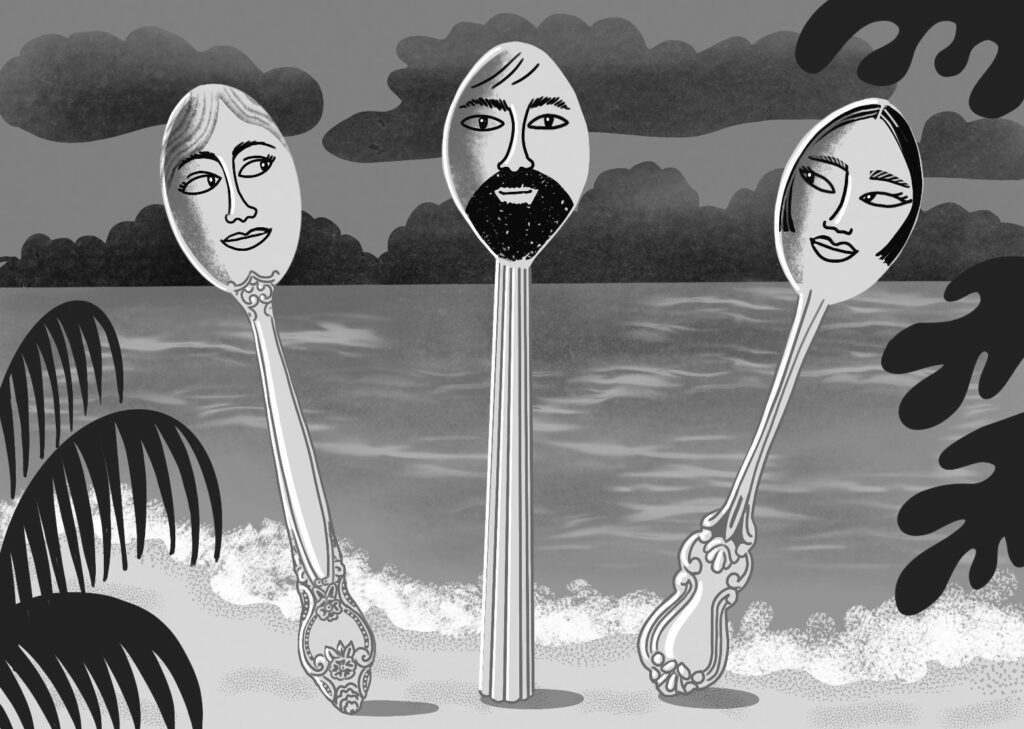A fraught destination wedding brings together a trio of struggling friends in Leanne Toshiko Simpson’s genre-bending debut. This deeply felt story, set in an upscale Turks and Caicos resort and the suburbs of Toronto, masquerades as a lighthearted romantic comedy, even as it probes intimate, personal strife. With its perfectly deflective title, Never Been Better captures how treacherous it can be to confess to strong emotions.
The novel opens with the obstinate yet compelling narrator, Dee Foster, receiving a wedding invitation from her friends Matt and Misa, whom she met at a psych ward. The three bonded while undergoing group treatment for bipolar disorder, but their friendship became complicated when Matt and Misa got together. The atmosphere of the hospital, Dee explains, made desire inevitable: “No one here wanted to touch us, but a few of us definitely wanted to touch each other.”

The love triangle starts in the psych ward and ends on the beach.
Jamie Bennett
Months after her discharge, Dee has not revealed that she, too, fell for Matt. After scowling at the engagement photo and watching her wild-card sister, Tilley, throw a few darts at it, Dee insists that she is fine. She ceremoniously shreds the invitation and lists “five good reasons why I — and not Misa — should have ended up with Matt.” The list opens with “Dibs,” an important rule of friendship: “Not to brag or anything, but I wound up in the psych ward first.” She recounts her initial night in the treatment centre, when Matt “rolled into the hospital with bandages wound around his forearms and a crooked smile that lit up the ER.” The charming new patient — with his macabre sarcasm and “teddy bear” build — was a far cry from a stereotypical stud. But humour, pain, and love are inextricably linked in Simpson’s off-kilter world, and Matt represents a perfect balance among all three.
After some convincing from Tilley, who wants “a discounted island vacation,” Dee unenthusiastically boards the plane for Providenciales. Shortly after their arrival, tension begins to build. In the days leading up to the ceremony, Dee avoids Misa; Matt stops taking his medication; Tilley loses Misa’s wedding band; and Dee goes on a date with the best man. In a memorable scene, Misa gets cold feet after talking to her future mother-in-law about having children. Then Dee rents a kayak to help Misa escape from the bridal brunch, hoping they can mend their relationship. “I don’t know that I’m going to decide the future of my uterus in a kayak,” Misa tells Dee as they paddle, “but I think when that time comes, I’d like to talk to you about it.” Their reconciliation is a turning point for Dee. Back on land, her resentment and obsession dissipate. She finds a new perspective on the situation: “I’d have to take some kind of step forward in my own life or risk sinking completely.”
Beneath the funny, romantic facade of Never Been Better, Simpson considers a broader context. Her characters reflect on the unwelcome aspects of tourism in Turks and Caicos (“details you’d never read about in a tourist guide”), the difficulty of managing mental health without the support of loved ones (“no one else was ever going to show up for us”), and the dispossession and internment of Japanese Canadians. Dee notices the enduring impact of multi-generational trauma in Misa’s family. Her sincere insights stand out among her otherwise wry storytelling. “It was all too easy to forget how that history intersected with our time at the hospital,” she says. “Coming from a family that had experienced generations of pain, for Misa, it could feel impossible to acknowledge yet another struggle they would have to face together.”
The narrative shape is reflected in the playlist of chapter titles, all of which are from pop songs. From the ironic “Crazy in Love” to the lively “Family Affair,” each tune adds a layer of meaning to the text. Frequent flashbacks to Dee’s hospital stay also provide structure and depth. Drawing on her own experience with bipolar disorder, Simpson engages with the language of chronic illness. “Healthy people expect you to have a certain supply of energy to get things done,” Dee remembers learning from a counsellor in group therapy. “That’s what she called our ‘spoons.’ But when you have chronic pain, or mental illness, or other disabilities, you can’t predict how many spoons you start out with, and it’s almost always fewer than you need.” As the trip progresses, utensils begin to run out for the three friends. The exhausting love triangle ends with Dee’s revelation: “Maybe the only thing I couldn’t see was that waiting for Matt had kept me spinning in place for an entire year.”
Through Dee’s emotional turbulence, Tilley provides most of the comic relief. Her amusing, quick-witted persona initially obscures the stabilizing role she plays in her sister’s life. Tired of the drama, she confesses in a drunken tirade, “I object to this wedding,” and gallantly shouts during the rehearsal dinner, “True love is all-inclusive!” Later that night, as they sober up, Dee complains about the slew of catastrophes thus far. In response, Tilley asks her the most important question of the novel: “How can I ever live my own life if I’m always wrapped up in yours?” In the end, Never Been Better is more about the value of familial and platonic love than about the pursuit of marriage, and this concluding surprise is a welcome one.
Kayla Penteliuk studies and teaches literature at McGill University.

